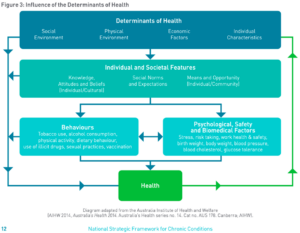Chronic Health Conditions
A chronic health condition is one that has been (or is likely to be) present for six months or longer, for example, asthma, cancer, heart disease, diabetes, arthritis and stroke. Chronic conditions are the leading cause of illness, disability and death in Australia.
Chronic conditions are becoming increasingly common due to our ageing population, as well as our changing lifestyles. The increasing prevalence of chronic conditions, combined with their long-term and persistent nature, and their impact on quality of life and overall health, is placing increasing pressure on individuals, families, our communities and the health system.
Optimum Intake’s Approach:
Optimum Intake’s new approach recognises that there are often similar underlying principles for the prevention and management of many chronic conditions. As such, we encourage our clients to have yearly Nutrition Check-Ups, just like you would regularly service your car to make sure it is running well or to identify if any areas need extra attention and take action before it turns into something more concerning. Optimum Intake’s dietitians support our clients to work towards taking charge of their health in the prevention of chronic illnesses by reviewing their food patterns and eating behaivours. We will form a plan of action to help those who have a current chronic condition, enabling them to better manage through dietary interventions.
Current evidence:
In 2014–2015, more than 50 per cent of Australians reported having at least one chronic condition, and 1 in 4 (23 per cent) reported having two or more chronic conditions. The likelihood of having one or more chronic conditions increases with age, and in Australia’s ageing population there is a corresponding increase in multimorbidities. Almost 1 in 3 Australians (29 per cent) aged 65 and over reported having three or more chronic diseases, compared with just 2.4 per cent of those aged under 45. Having more than one chronic condition is associated with worse health outcomes, more complex disease management and increased health costs. These statistics support the need for a lifestyle revamp in how Australians are currently managing their health and work towards preventive strategies. Focusing attention toward prevention activities, while continuing to ensure chronic conditions are well managed, will provide better health, social and economic outcomes for all Australians.
Determinants of Health:
How we eat and how often we move, is not the only determinant to living a healthy life. The determinants of health fall into four main categories:
• Physical environment — for example, housing, sanitation and the natural and built environments;
• Social environment — for example, education, employment, political structures, relationships and culture;
• Economic factors— for example, income, expenditure and affordability; and
• Individual characteristics — for example, sex, genetics and physical or mental determinants

Medicare Rebates and your GP:
Collaborating with your GP, Optimum Intake Dietitians can help you take charge of your eating, to place you in the best position to ensure that your body receives optimum nutrition alongside optimum enjoyment from food and eating. Medicare supports the collaboration of Allied Health Providers, such as dietitians, who will work with your GP to devise a managment plan to put in place the supports you need to prevent and manage your chronic conditions, through a referral process.
The Medicare items are designed for patients who require a structured approach and to enable GPs to plan and coordinate the care of patients with complex conditions requiring ongoing care from a multidisciplinary care team. Your GP will determine whether a plan is appropriate for you.
There are two types of plans that can be prepared by a General Practitioner (GP) for Chronic Disease Management (CDM):
- GPManagement Plan(GPMP); and
- Team Care Arrangements (TCAs). If you have a chronic (or terminal) medical condition, your GP may suggest a GPMP. If you also have complex care needs and require treatment from two or more other health care providers, your GP may suggest TCAsas well.
To find out more information speak with your GP, or call us on 0499008451. The rebates will support your financially to access our services and take charge of your health.

